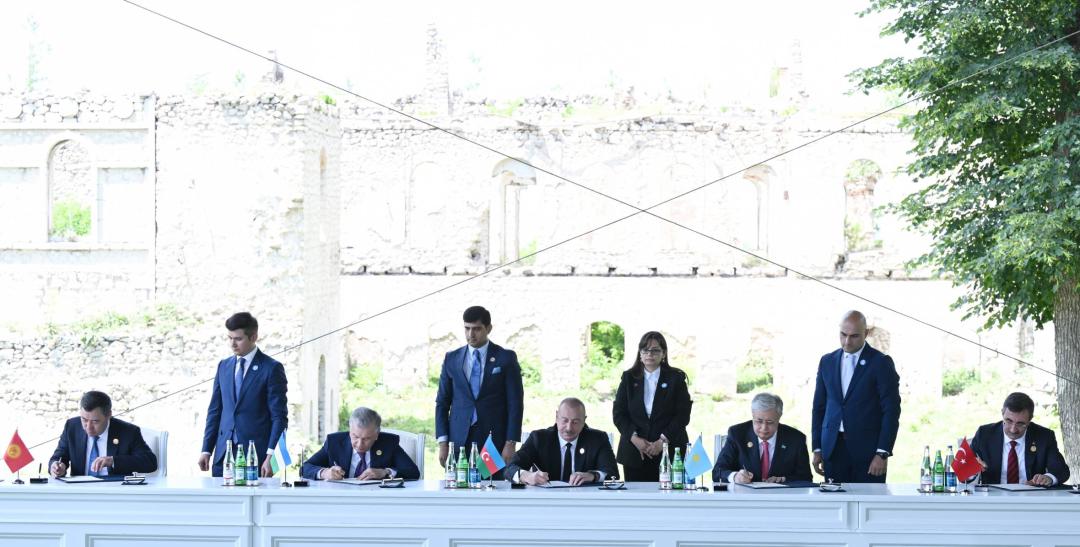
Turkic States Solidify Ties with "Karabakh Declaration", EU Reacts to Orban's Participation

On July 6, an informal summit of heads of state of the Organization of Turkic States was held in Shusha. The summit was attended by President of Azerbaijan Ilham Aliyev, President of Uzbekistan Shavkat Mirziyoyev, President of Kyrgyzstan Sadyr Zhaparov, President of Kazakhstan Kassym-Jomart Tokayev, Prime Minister of Hungary Viktor Orban, Vice President of Türkiye Cevdet Yilmaz, President of the Turkish Republic of Northern Cyprus Ersin Tatar, and Secretary General of the Organization of Turkic States Kubanychbek Omuraliev.
Azerbaijan's President Aliyev addressed the budget and structure of the Organization of Turkic States, saying, "I believe that the current budget of the Organization of Turkic States is insufficient for the realization of our goals. With this in mind, Azerbaijan has recently made a financial contribution of 2 million U.S. dollars to the Secretariat of the Organization."
He emphasized the importance of the East-West transport corridor, noting, "The expansion of the East-West transport corridor is one of our top priorities. In the last five years, the volume of cargo transportation through the East-West transport corridor has increased by more than 60 percent. The annual handling capacity of the Baku-Tbilisi-Kars railway, an integral part of the Middle Corridor, has been increased from 1 million to 5 million tons thanks to additional investments by Azerbaijan. With a fleet of more than 50 commercial ships in the Caspian Sea, Azerbaijan provides important transit services for Turkic states. In light of the increasing cargo transportation, six tankers and dry cargo vessels are currently under construction at the Baku Shipyard. Next year, our country’s ninth international airport will be commissioned in Lachin. The cargo handling capacity of the Alat International Trade Seaport will be expanded from 15 million to 25 million tons."
On the same day, the “Karabakh Declaration” of the Informal Summit of the Organization of Turkic States was signed in Shusha.
EU's Borrell Criticizes Orban's Representation at Turkic States Summit
On July 5, Josep Borrell, the head of the European Union's Foreign Policy Department, remarked that Orban lacked a mandate from the EU to represent it at the summit. Borrell emphasized the EU's stance: "The European Union rejects attempts to legitimize the Turkish Cypriot separatist entity and recognizes only the Republic of Cyprus."
During the summit in Shusha, Viktor Orban characterized the Organization of Turkic States as "a very important organization for cooperation between the West and the East." He specifically thanked Azerbaijani President Ilham Aliyev for facilitating peace for thousands in the region. Orban expressed his hope that similar peaceful opportunities could soon emerge in Europe.
Unrecognised Northern Cyprus President Foresees OTS Evolution into Turkic Union After Shusha Meeting
On July 9, President of the Turkish Republic of Northern Cyprus (TRNC) Ersin Tatar stated that the Organization of Turkic States (OTS) would eventually become the Turkic Union.
Tatar mentioned that the TRNC's OTS membership would be prioritized in the future: "We are currently continuing our mission as an observer state to the OTS. The relations will develop further in the future. In order to get everyone's support, it is necessary to solve a number of issues and go through some political processes. However, the observer mission has indeed earned an important place for the Turkish Republic of Northern Cyprus."
He highlighted the active participation of TRNC ministries, ministers, NGOs, the chamber of commerce and industry, and educational institutions in OTS events and meetings in different countries. Tatar emphasized that the Turkic Union would be comparable to the European Union: "Therefore, with the transformation of OTS, which has a population of more than 200 million people, into the Turkic Union, trade, economic relations, and cultural ties between the Turkic states will further develop, relations between youth will be strengthened, and communication using the same alphabet will lead us to a stronger future."
He further stressed the importance of harmonizing different dialects and alphabets within the Turkic states: "If it is achieved, the Turkic Union will indeed be able to provide substantial prosperity to our peoples."
See Also


Mirzoyan Meets US Deputy Assistant Secretary Joshua Huck

Azerbaijani President Holds Talks with UAE and German Business Delegations on Economic Cooperation

Grigoryan Confirms Armenia’s Readiness to Dissolve OSCE Minsk Group Upon Peace Treaty Signing

Azerbaijani Official Warns of Ecological Risks to Caspian Sea, Similar to Lake Urmia and Aral Sea

